Charles E W Bean, Diaries, AWM38 3DRL 606/261/1 - 1929 - 1930 - Part 7
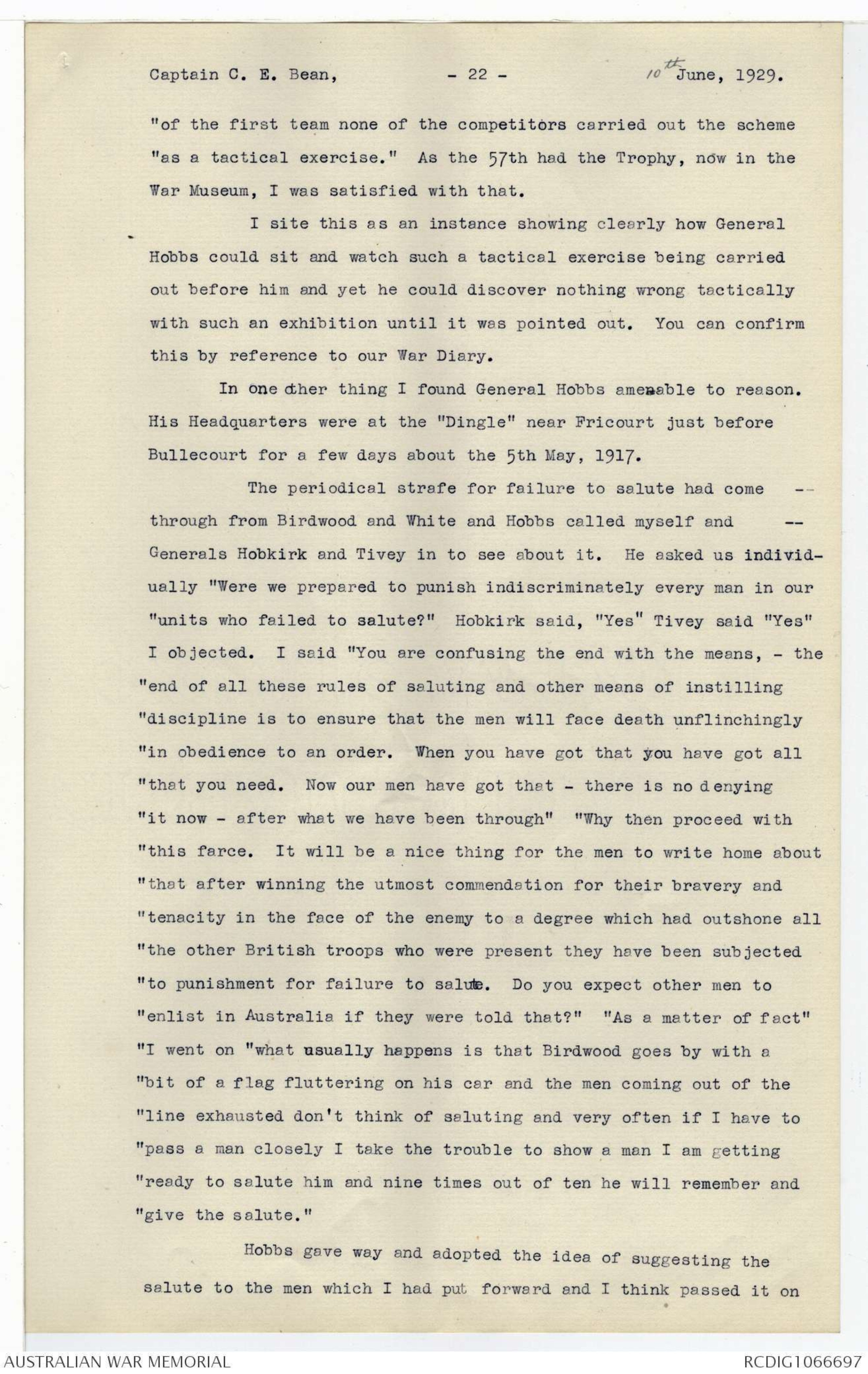
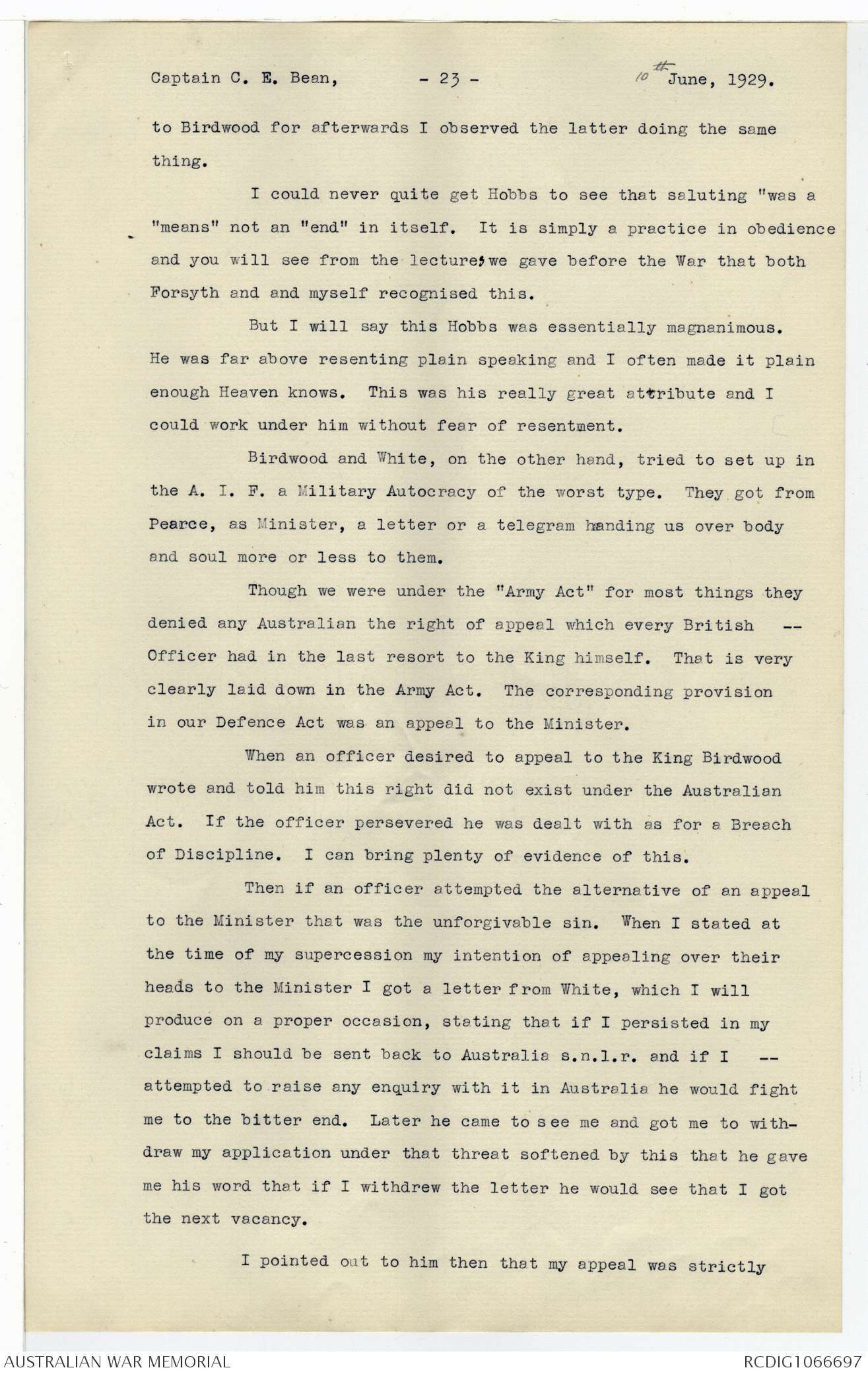
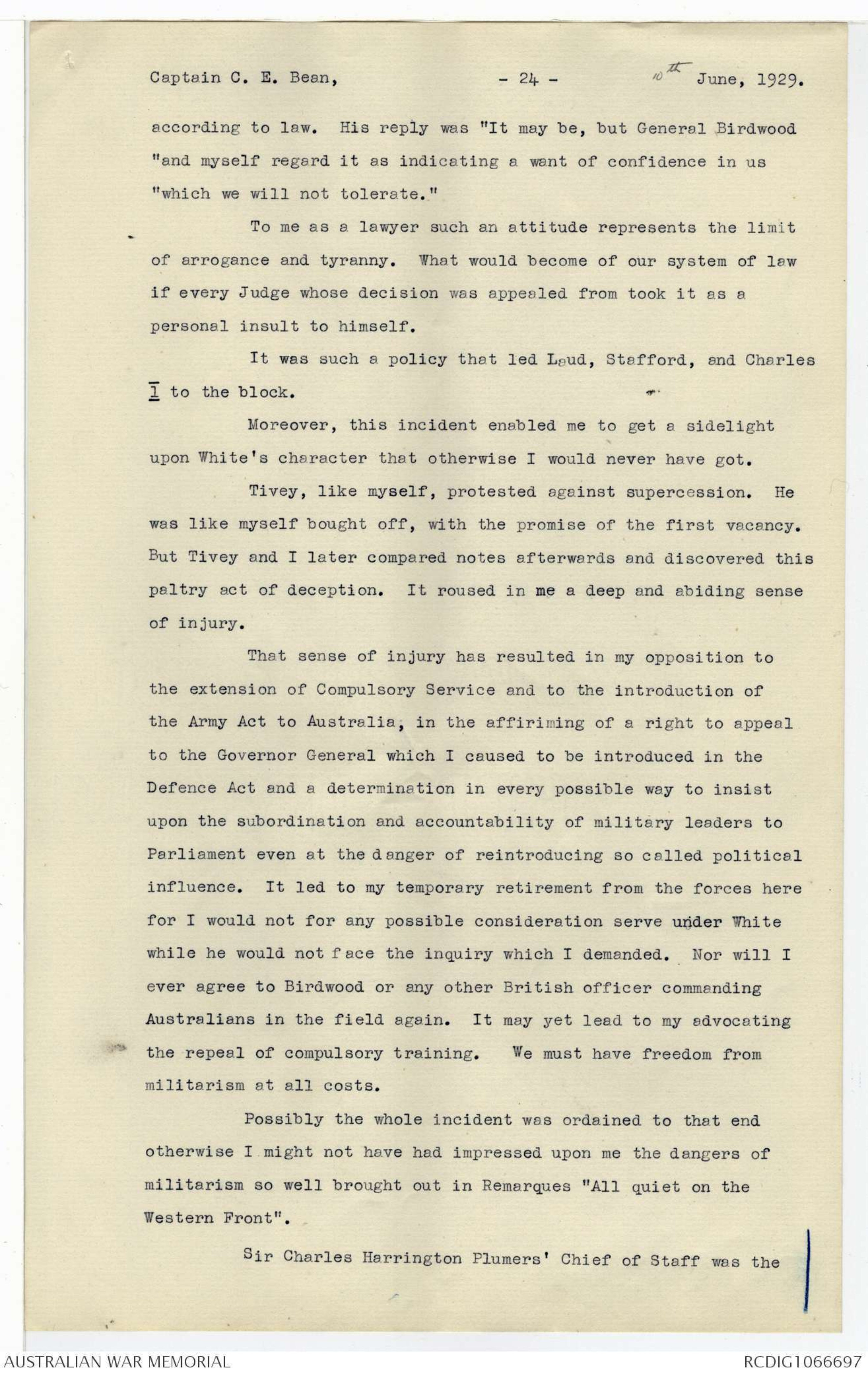
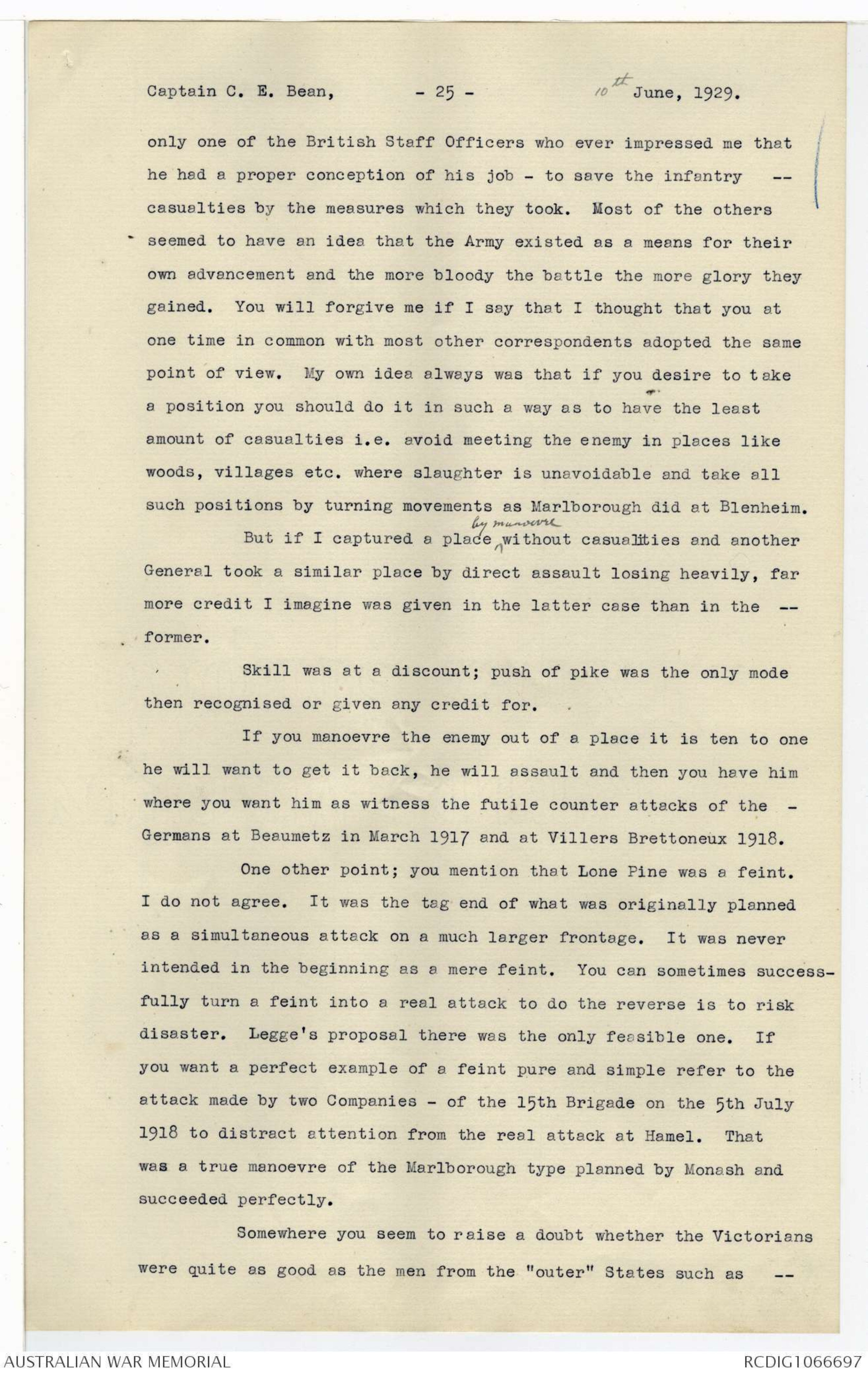
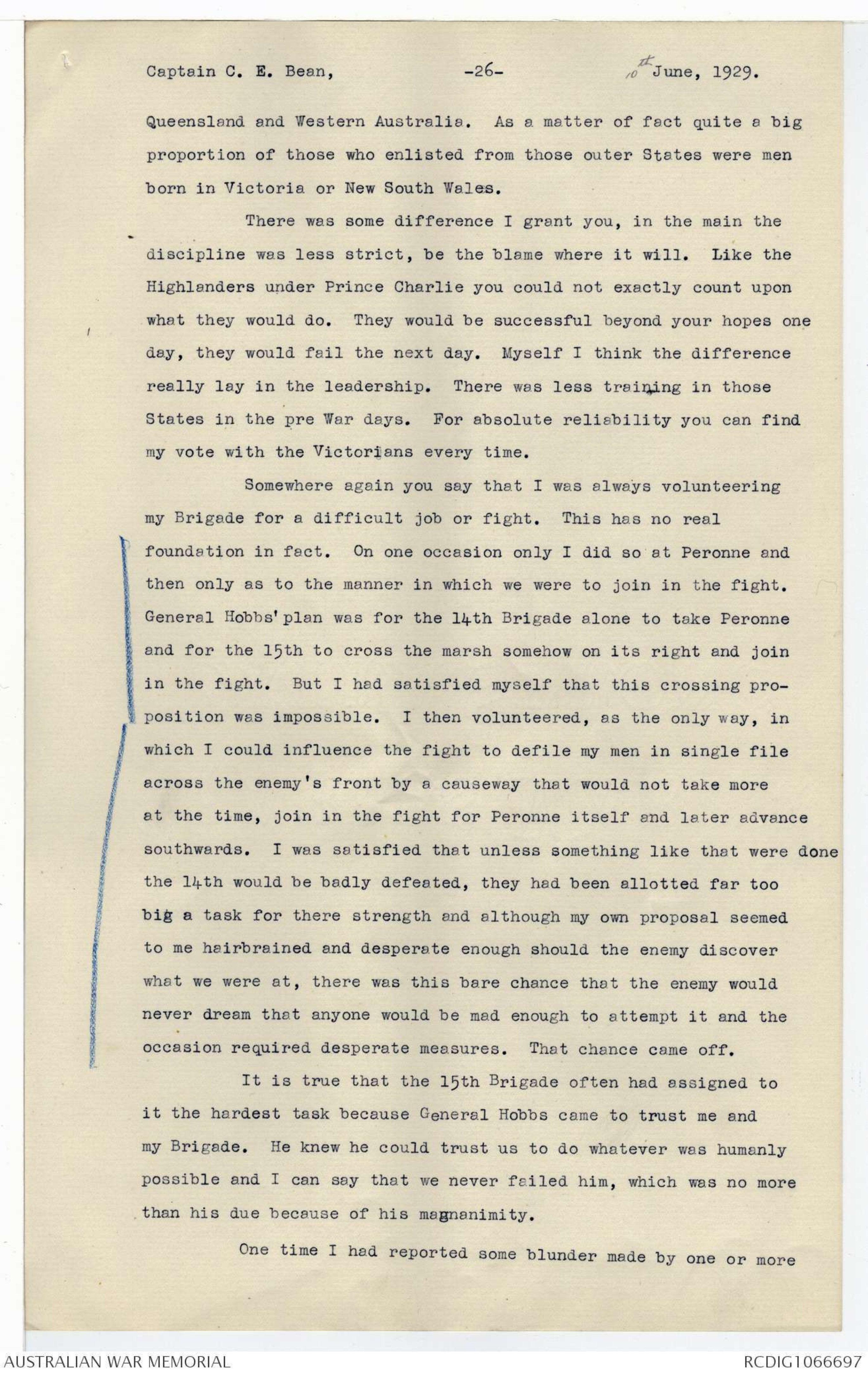
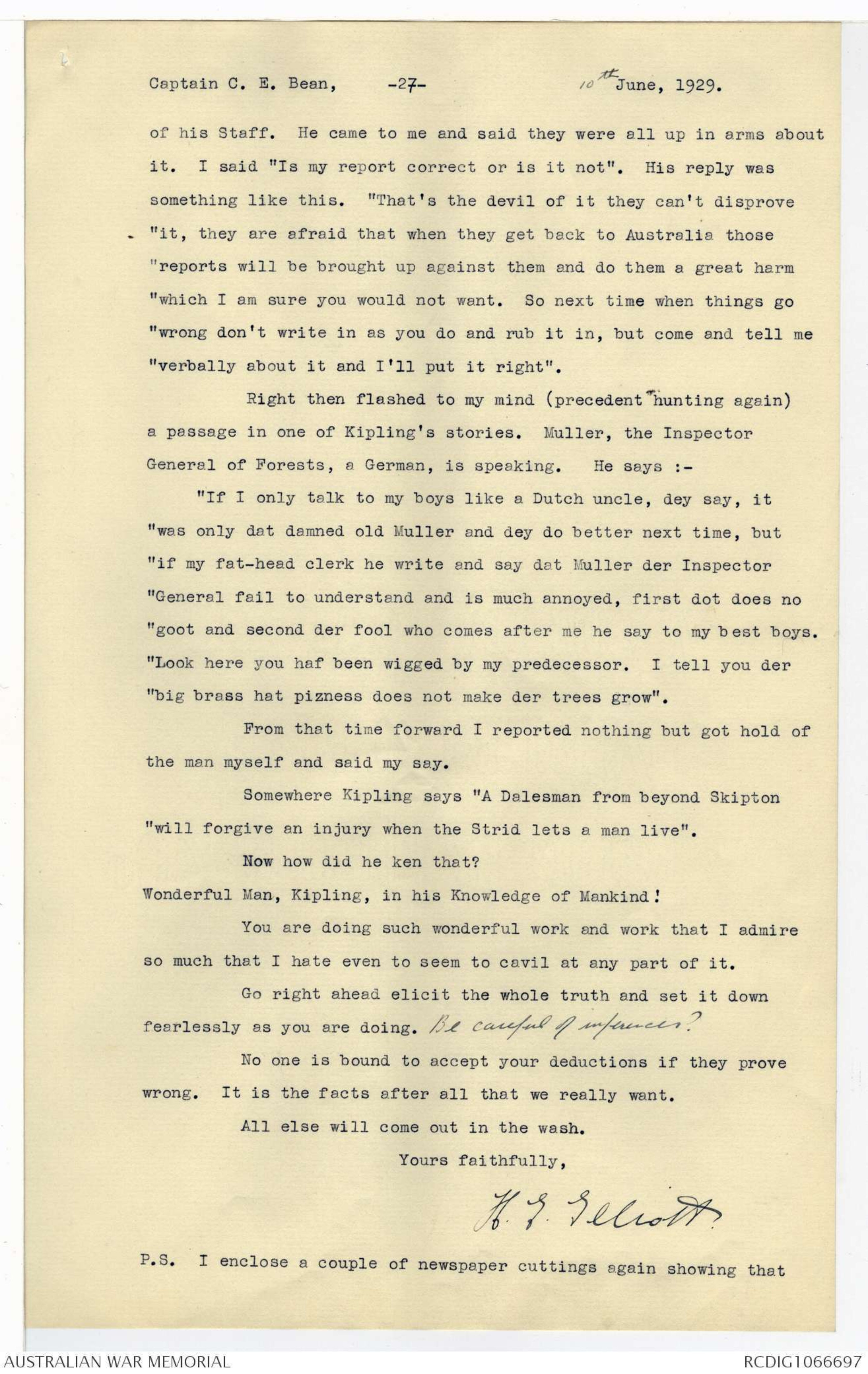
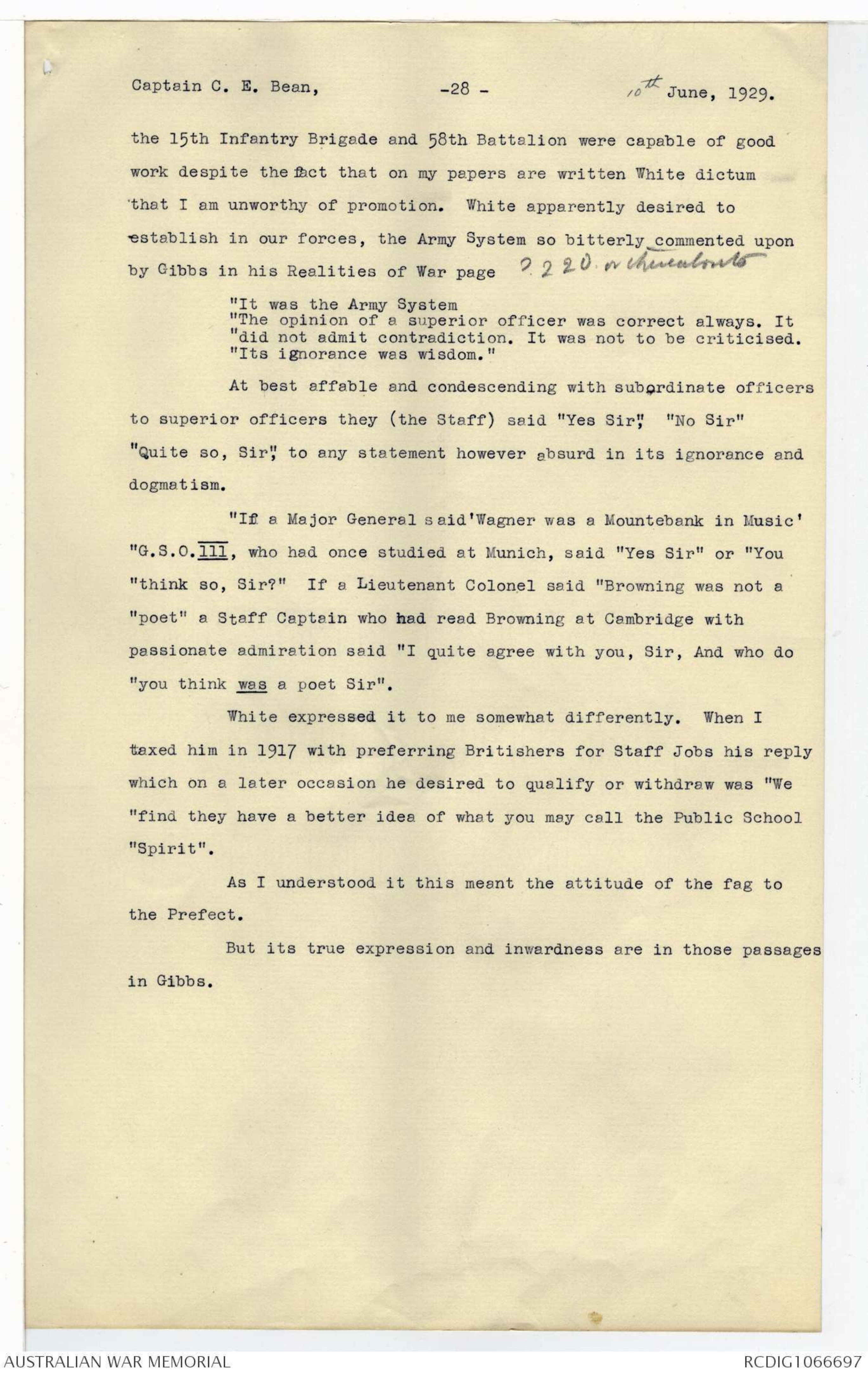
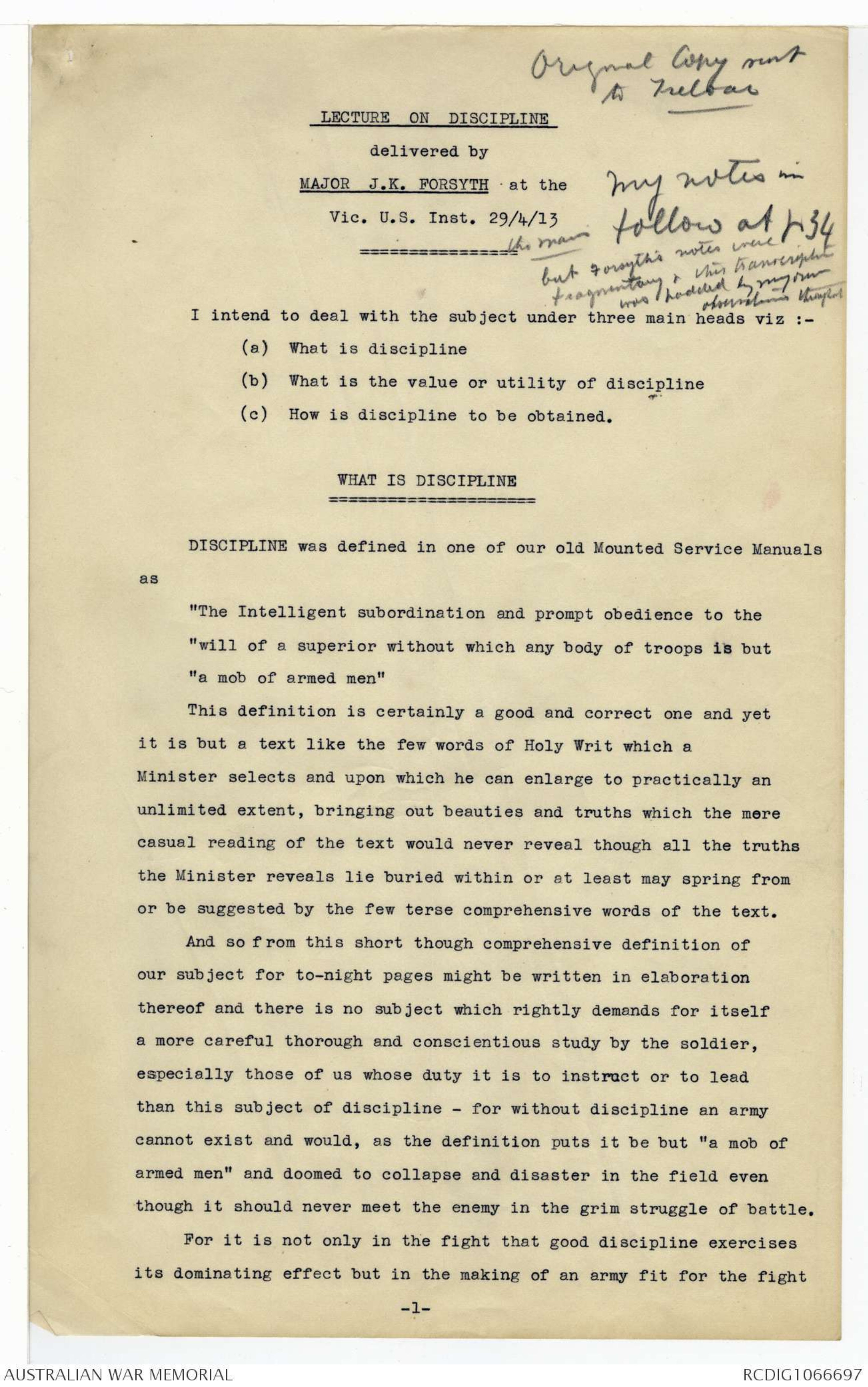
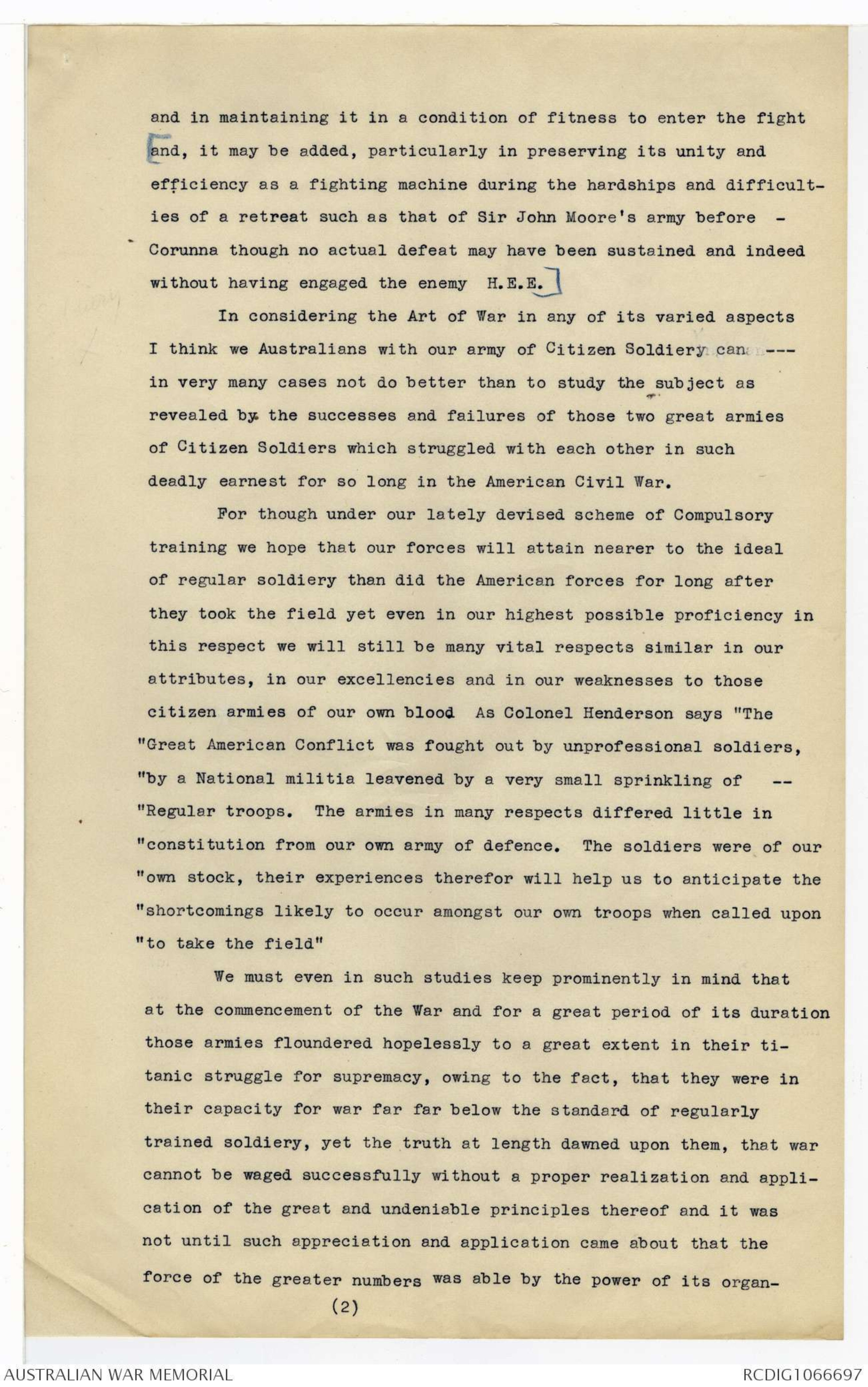
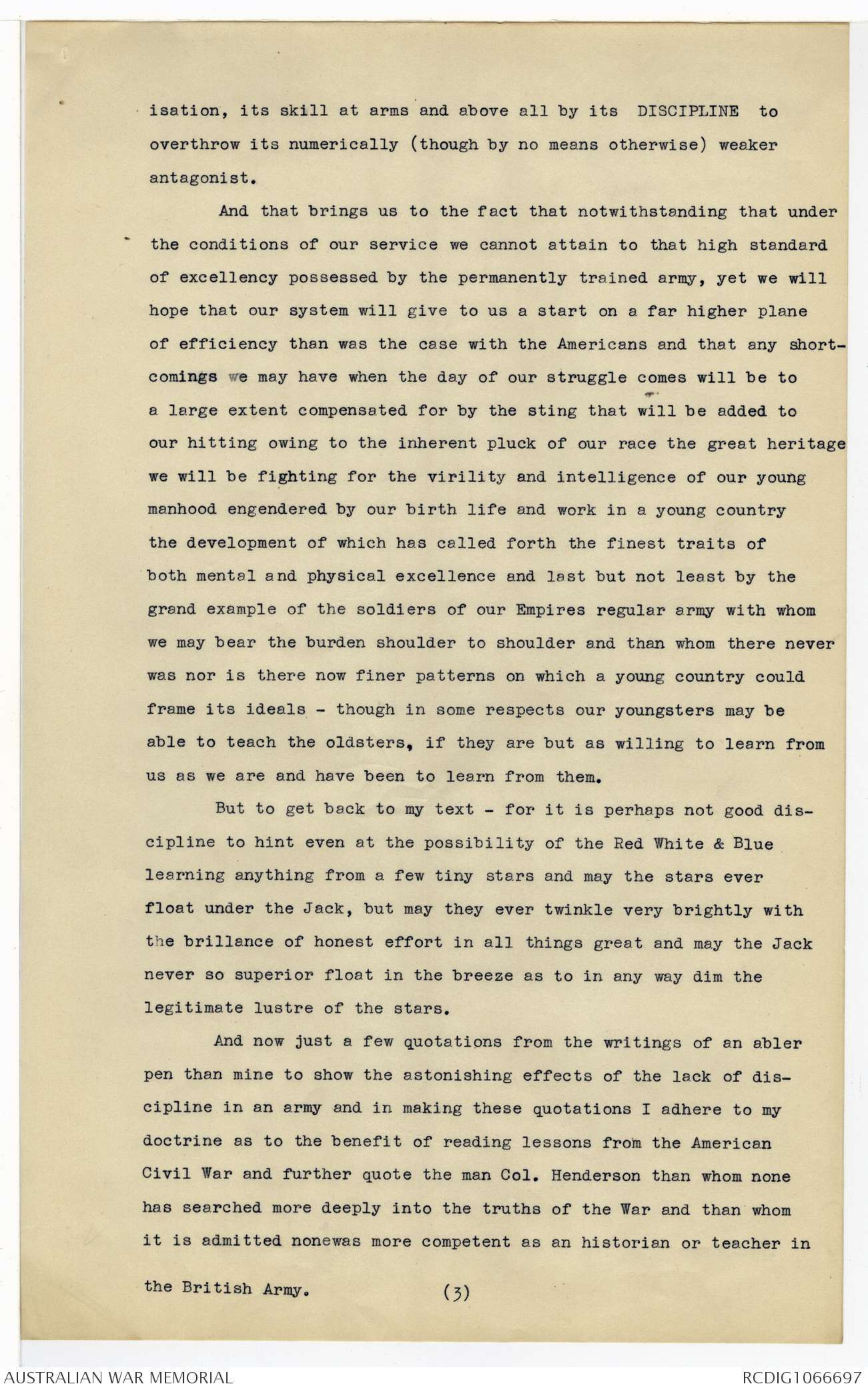
Captain C. E. Bean, - 22 - 10th June, 1929.
"of the first team none of the competitors carried out the scheme
"as a tactical exercise." As the 57th had the Trophy, now in the
War Museum, I was satisfied with that.
I site this as an instance showing clearly how General
Hobbs could sit and watch such a tactical exercise being carried
out before him and yet he could discover nothing wrong tactically
with such an exhibition until it was pointed out. You can confirm
this by reference to our War Diary.
In one other thing I found General Hobbs amenable to reason.
His Headquarters were at the "Dingle" near Fricourt just before
Bullecourt for a few days about the 5th May, 1917.
The periodical strafe for failure to salute had come --
through from Birdwood and White and Hobbs called myself and --
Generals Hobkirk and Tivey in to see about it. He asked us individually
"Were we prepared to punish indiscriminately every man in our
"units who failed to salute?" Hobkirk said, "Yes" Tivey said "Yes"
I objected. I said "You are confusing the end with the means, - the
"end of all these rules of saluting and other means of instilling
"discipline is to ensure that the men will face death unflinchingly
"in obedience to an order. When you have got that you have got all
"that you need. Now our men have got that - there is no denying
"it now - after what we have been through" "Why then proceed with
"this farce. It will be a nice thing for the men to write home about
"that after winning the utmost commendation for their bravery and
"tenacity in the face of the enemy to a degree which had outshone all
"the other British troops who were present they have been subjected
"to punishment for failure to salute. Do you expect other men to
"enlist in Australia if they were told that?" "As a matter of fact"
"I went on "what usually happens is that Birdwood goes by with a
"bit of a flag fluttering on his car and the men coming out of the
"line exhausted don't think of saluting and very often if I have to
"pass a man closely I take the trouble to show a man I am getting
"ready to salute him and nine times out of ten he will remember and
"give the salute."
Hobbs gave way and adopted the idea of suggesting the
salute to the men which I had put forward and I think passed it on
Captain C. E. Bean, - 23 - 10th June, 1929.
to Birdwood for afterwards I observed the latter doing the same
thing.
I could never quite get Hobbs to see that saluting "was a
"means" not an "end" in itself. It is simply a practice in obedience
and you will see from the lectures we gave before the War that both
Forsyth and and myself recognised this.
But I will say this Hobbs was essentially magnanimous.
He was far above resenting plain speaking and I often made it plain
enough Heaven knows. This was his really great attribute and I
could work under him without fear of resentment.
Birdwood and White, on the other hand, tried to set up in
the A. I. F. a Military Autocracy of the worst type. They got from
Pearce, as Minister, a letter or a telegram handing us over body
and soul more or less to them.
Though we were under the "Army Act" for most things they
denied any Australian the right of appeal which every British --
Officer had in the last resort to the King himself. That is very
clearly laid down in the Army Act. The corresponding provision
in our Defence Act was an appeal to the Minister.
When an officer desired to appeal to the King Birdwood
wrote and told him this right did not exist under the Australian
Act. If the officer persevered he was dealt with as for a Breach
of Discipline. I can bring plenty of evidence of this.
Then if an officer attempted the alternative of an appeal
to the Minister that was the unforgivable sin. When I stated at
the time of my supercession my intention of appealing over their
heads to the Minister I got a letter from White, which I will
produce on a proper occasion, stating that if I persisted in my
claims I should be sent back to Australia s. n. l. r. and if I --
attempted to raise any enquiry with it in Australia he would fight
me to the bitter end. Later he came to see me and got me to withdraw
my application under that threat softened by this that he gave
me his word that if I withdrew the letter he would see that I got
the next vacancy.
I pointed out to him then that my appeal was strictly
Captain C. E. Bean, - 24 - 10th June, 1929.
according to law. His reply was "It may be, but General Birdwood
"and myself regard it as indicating a want of confidence in us
"which we will not tolerate."
To me as a lawyer such an attitude represents the limit
of arrogance and tyranny. What would become of our system of law
if every Judge whose decision was appealed from took it as a
personal insult to himself.
It was such a policy that led Laud, Stafford, and Charles
1 to the block.
Moreover, this incident enabled me to get a sidelight
upon White's character that otherwise I would never have got.
Tivey, like myself, protested against supercession. He
was like myself bought off, with the promise of the first vacancy.
But Tivey and I later compared notes afterwards and discovered this
paltry act of deception. It roused in me a deep and abiding sense
of injury.
That sense of injury has resulted in my opposition to
the extension of Compulsory Service and to the introduction of
the Army Act to Australia; in the affiriming of a right to appeal
to the Governor General which I caused to be introduced in the
Defence Act and a determination in every possible way to insist
upon the subordination and accountability of military leaders to
Parliament even at the danger of reintroducing so called political
influence. It led to my temporary retirement from the forces here
for I would not for any possible consideration serve under White
while he would not face the inquiry which I demanded. Nor will I
ever agree to Birdwood or any other British officer commanding
Australians in the field again. It may yet lead to my advocating
the repeal of compulsory training. We must have freedom from
militarism at all costs.
Possibly the whole incident was ordained to that end
otherwise I might not have had impressed upon me the dangers of
militarism so well brought out in Remarques "All quiet on the
Western Front".
Sir Charles Harrington Plumers' Chief of Staff was the
Captain C. E. Bean, - 25 - 10th June, 1929.
only one of the British Staff Officers who ever impressed me that
he had a proper conception of his job - to save the infantry --
casualties by the measures which they took. Most of the others
seemed to have an idea that the Army existed as a means for their
own advancement and the more bloody the battle the more glory they
gained. You will forgive me if I say that I thought that you at
one time in common with most other correspondents adopted the same
point of view. My own idea always was that if you desire to take
a position you should do it in such a way as to have the least
amount of casualties i.e. avoid meeting the enemy in places like
woods, villages etc. where slaughter is unavoidable and take all
such positions by turning movements as Marlborough did at Blenheim.
But if I captured a place ^by manoevre without causalities and another
General took a similar place by direct assault losing heavily, far
more credit I imagine was given in the latter case than in the --
former.
Skill was at a discount; push of pike was the only mode
then recognised or given any credit for.
If you manoevre the enemy out of a place it is ten to one
he will want to get it back, he will assault and then you have him
where you want him as witness the futile counter attacks of the -
Germans at Beaumetz in March 1917 and at Villers Brettoneux 1918.
One other point; you mention that Lone Pine was a feint.
I do not agree. It was the tag end of what was originally planned
as a simultaneous attack on a much larger frontage. It was never
intended in the beginning as a mere feint. You can sometimes successfully
turn a feint into a real attack to do the reverse is to risk
disaster. Legge's proposal there was the only feasible one. If
you want a perfect example of a feint pure and simple refer to the
attack made by two Companies - of the 15th Brigade on the 5th July
1918 to distract attention from the real attack at Hamel. That
was a true manoevre of the Marlborough type planned by Monash and
succeeded perfectly.
Somewhere you seem to raise a doubt whether the Victorians
were quite as good as the men from the "outer" States such as --
Captain C. E. Bean, -26- 10th June 1929
Queensland and Western Australia. As a matter of fact quite a big
proportion of those who enlisted from those outer States were men
born in Victoria or New South Wales.
There was some difference I grant you, in the main the
discipline was less strict, be the blame where it will. Like the
Highlanders under Prince Charlie you could not exactly count upon
what they would do. They would be successful beyond your hopes one
day, they would fail the next day. Myself I think the difference
really lay in the leadership. There was less training in those
States in the pre War days. For absolute reliability you can find
my vote with the Victorians every time.
Somewhere again you say that I was always volunteering
my Brigade for a difficult job or fight. This has no real
foundation in fact. On one occasion only I did so at Peronne and
then only as to the manner in which we were to join in the fight.
General Hobbs' plan was for the 14th Brigade alone to take Peronne
and for the 15th to cross the marsh somehow on its right and join
in the fight. But I had satisfied myself that this crossing proposition
was impossible. I then volunteered, as the only way, in
which I could influence the fight to defile my men in single file
across the enemy's front by a causeway that would not take more
at the time, join in the fight for Peronne itself and later advance
southwards. I was satisfied that unless something like that were done
the 14th would be badly defeated, they had been allotted far too
big a task for there strength and although my own proposal seemed
to me hairbrained and desperate enough should the enemy discover
what we were at, there was this bare chance that the enemy would
never dream that anyone would be mad enough to attempt it and the
occasion required desperate measures. That chance came off.
It is true that the 15th Brigade often had assigned to
it the hardest task because General Hobbs came to trust me and
my Brigade. He knew he could trust us to do whatever was humanly
possible and I can say that we never failed him, which was no more
than his due because of his magnanimity.
One time I had reported some blunder made by one or more
Captain C. E. Bean, -27- 10th June 1929
of his Staff. He came to me and said they were all up in arms about
it. I said "Is my report correct or is it not". His reply was
something like this. "That's the devil of it they can't disprove
"it, they are afraid that when they get back to Australia those
"reports will be brought up against them and do them a great harm
"which I am sure you would not want. So next time when things go
"wrong don't write in as you do and rub it in, but come and tell me
"verbally about it and I'll put it right".
Right then flashed to my mind (precedent hunting again)
a passage in one of Kipling's stories. Muller, the Inspector
General of Forests, a German, is speaking. He says :-
"If I only talk to my boys like a Dutch uncle, dey say, it
"was only dat damned old Muller and dey do better next time, but
"if my fat-head clerk he write and say dat Muller der Inspector
"General fail to understand and is much annoyed, first dot does no
"goot and second der fool who comes after me he say to my best boys.
"Look here you haf been wigged by my predecessor. I tell you der
"big brass hat pizness does not make der trees grow".
From that time forward I reported nothing but got hold of
the man myself and said my say.
Somewhere Kipling says "A Dalesman from beyond Skipton
"will forgive an injury when the Strid lets a man live".
Now how did he ken that?
Wonderful Man, Kipling, in his Knowledge of Mankind!
You are doing such wonderful work and work that I admire
so much that I hate even to seem to cavil at any part of it.
Go right ahead elicit the whole truth and set it down
fearlessly as you are doing. Be careful of inferences?
No one is bound to accept your deductions if they prove
wrong. It is the facts after all that we really want.
All else will come out in the wash.
Yours faithfully,
H. E. Elliott
P.S. I enclose a couple of newspaper cuttings again showing that
Captain C. E. Bean, -28 - 10th June 1929
the 15th Infantry Brigade and 58th Battalion were capable of good
work despite the fact that on my papers are written White dictum
that I am unworthy of promotion. White apparently desired to
establish in our forces, the Army System so bitterly commented upon
by Gibbs in his Realities of War page ? 220. or thereabouts
"It was the Army System
"The opinion of a superior officer was correct always. It
"did not admit contradiction. It was not to be criticised.
"Its ignorance was wisdom."
At best affable and condescending with subordinate officers
to superior officers they (the Staff) said "Yes Sir," "No Sir"
Quite so, Sir," to any statement however absurd in its ignorance and
dogmatism.
"If a Major General said 'Wagner was a Mountebank in Music
"G. S. O. 111, who had once studied at Munich, said "Yes Sir" or "You
"think so, Sir?" If a Lieutenant Colonel said "Browning was not a
"poet" a Staff Captain who had read Browning at Cambridge with
passionate admiration said "I quite agree with you, Sir, And who do
"you think was a poet Sir".
White expressed it to me somewhat differently. When I
taxed him in 1917 with preferring Britishers for Staff Jobs his reply
which on a later occasion he desired to qualify or withdraw was "We
"find they have a better idea of what you may call the Public School
"Spirit".
As I understood it this meant the attitude of the fag to
the Prefect.
But its true expression and inwardness are in those passages
in Gibbs.
Original Copy sent
to Treloar
LECTURE ON DISCIPLINE
delivered by
MAJOR J. K. FORSYTH at the
Vic. U.S. Inst. 29/4/13
==================
[*My notes in
the main follow at p 34
but Forsyth's notes were
fragmentary & this transcription
was padded by my own
observations throughout*]
I intend to deal with the subject under three main heads viz :-
(a) What is discipline
(b) What is the value or utility of discipline
(c) How is discipline to be obtained.
WHAT IS DISCIPLINE
==================
DISCIPLINE was defined in one of our old Mounted Service Manuals
as
"The Intelligent subordination and prompt obedience to the
"will of a superior without which any body of troops is but
"a mob of armed men"
This definition is certainly a good and correct one and yet
it is but a text like the few words of Holy Writ which a
Minister selects and upon which he can enlarge to practically an
unlimited extent, bringing out beauties and truths which the mere
casual reading of the text would never reveal though all the truths
the Minister reveals lie buried within or at least may spring from
or be suggested by the few terse comprehensive words of the text.
And so from this short though comprehensive definition of
our subject for to-night pages might be written in elaboration
thereof and there is no subject which rightly demands for itself
a more careful thorough and conscientious study by the soldier,
especially those of us whose duty it is to instruct or to lead
than this subject of discipline - for without discipline an army
cannot exist and would, as the definition puts it be but "a mob of
armed men" and doomed to collapse and disaster in the field even
though it should never meet the enemy in the grim struggle of battle.
For it is not only in the fight that good discipline exercises
its dominating effect but in the making of an army fit for the fight
-1-
and in maintaining it in a condition of fitness to enter the fight
[and, it may be added, particularly in preserving its unity and
efficiency as a fighting machine during the hardships and difficulties
of a retreat such as that of Sir John Moore's army before -
Corunna though no actual defeat may have been sustained and indeed
without having engaged the enemy H.E.E.]
In considering the Art of War in any of its varied aspects
I think we Australians with our army of Citizen Soldiery can ---
in very many cases not do better than to study the subject as
revealed by the successes and failures of those two great armies
of Citizen Soldiers which struggled with each other in such
deadly earnest for so long in the American Civil War.
For though under our lately devised scheme of Compulsory
training we hope that our forces will attain nearer to the ideal
of regular soldiery than did the American forces for long after
they took the field yet even in our highest possible proficiency in
this respect we will still be many vital respects similar in our
attributes, in our excellencies and in our weaknesses to those
citizen armies of our own blood As Colonel Henderson says "The
"Great American Conflict was fought out by unprofessional soldiers,
"by a National militia leavened by a very small sprinkling of --
"Regular troops. The armies in many respects differed little in
"constitution from our own army of defence. The soldiers were of our
"own stock, their experiences therefor will help us to anticipate the
"shortcomings likely to occur amongst our own troops when called upon
"to take the field"
We must even in such studies keep prominently in mind that
at the commencement of the War and for a great period of its duration
those armies floundered hopelessly to a great extent in their titanic
struggle for supremacy, owing to the fact, that they were in
their capacity for war far far below the standard of regularly
trained soldiery, yet the truth at length dawned upon them, that war
cannot be waged successfully without a proper realization and application
of the great and undeniable principles thereof and it was
not until such appreciation and application came about that the
force of the greater numbers was able by the power of its organisation,
(2)
its skill at arms and above all by its DISCIPLINE to
overthrow its numerically (though by no means otherwise) weaker
antagonist.
And that brings us to the fact that notwithstanding that under
the conditions of our service we cannot attain to that high standard
of excellency possessed by the permanently trained army, yet we will
hope that our system will give to us a start on a far higher plane
of efficiency than was the case with the Americans and that any shortcomings
we may have when the day of our struggle comes will be to
a large extent compensated for by the sting that will be added to
our hitting owing to the inherent pluck of our race the great heritage
we will be fighting for the virility and intelligence of our young
manhood engendered by our birth life and work in a young country
the development of which has called forth the finest traits of
both mental and physical excellence and last but not least by the
grand example of the soldiers of our Empires regular army with whom
we may bear the burden shoulder to shoulder and than whom there never
was nor is there now finer patterns on which a young country could
frame its ideals - though in some respects our youngsters may be
able to teach the oldsters, if they are but as willing to learn from
us as we are and have been to learn from them.
But to get back to my text - for it is perhaps not good discipline
to hint even at the possibility of the Red White & Blue
learning anything from a few tiny stars and may the stars ever
float under the Jack, but may they ever twinkle very brightly with
the brillance of honest effort in all things great and may the Jack
never so superior float in the breeze as to in any way dim the
legitimate lustre of the stars.
And now just a few quotations from the writings of an abler
pen than mine to show the astonishing effects of the lack of discipline
in an army and in making these quotations I adhere to my
doctrine as to the benefit of reading lessons from the American
Civil War and further quote the man Col. Henderson than whom none
has searched more deeply into the truths of the War and than whom
it is admitted nonewas more competent as an historian or teacher in
the British Army.
(3)
 Sam scott
Sam scottThis transcription item is now locked to you for editing. To release the lock either Save your changes or Cancel.
This lock will be automatically released after 60 minutes of inactivity.